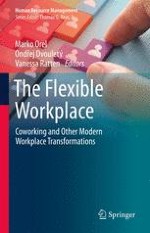
2021 | OriginalPaper | Buchkapitel
Beyond Coworking: From Flexible to Hybrid Spaces
verfasst von : Alessandra Migliore, Irene Manzini Ceinar, Chiara Tagliaro
Erschienen in: The Flexible Workplace
Verlag: Springer International Publishing
Aktivieren Sie unsere intelligente Suche, um passende Fachinhalte oder Patente zu finden.
Wählen Sie Textabschnitte aus um mit Künstlicher Intelligenz passenden Patente zu finden. powered by
Markieren Sie Textabschnitte, um KI-gestützt weitere passende Inhalte zu finden. powered by